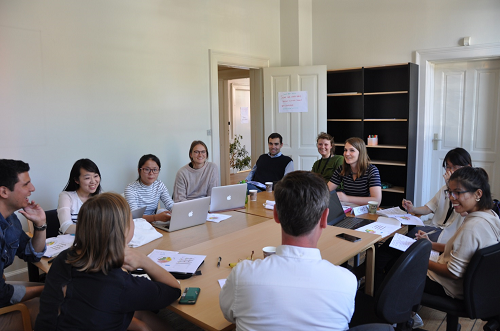EIT Health Summer School Turns Teaching Upside Down
20 students from all over the world meet in the Copenhagen campus at University of Copenhagen these days to devise digital solutions for senior citizens with the lifestyle disease type 2 diabetes. Instead of traditional ‘lecture-like’ teaching the students work closely together with patients, companies and public partners in the class room on patient-oriented solutions.
 Students Have to Think out of the Box
Students Have to Think out of the Box
The teaching method ‘Flipped Classroom’ turns the classroom upside down, so to speak, creating a learning environment where the students are faced with devising good solutions for an ageing society. Instead of giving lectures the instructors function as facilitators. The traditional lectures have been made available as online lessons on the Stanford platform Coursera. Here, the students have participated in preparatory teaching prior to the summer school, so they are ready to engage in the practical part of the summer school as soon as it begins.
The students do group work and are trained to translate health challenges into innovation targeted at the patients’ needs. The close cooperation with companies and other universities combined with a creative learning environment is vital to developing a successful summer school focussing on solving global societal challenges.
‘We want to take the students out of their comfort zones, making them think outside of the box and hopefully discover brand new ways of thinking treatment and prevention in cooperation with partners from both public and private organisations.
At the same time, the international network of EIT Health makes it possible for us to share our experiences with “flipped classroom” with other universities and to offer our students an international environment. Therefore, this year we have started cooperating with several strong partners, including Erasmus University Rotterdam and Uppsala University, who can contribute to our success from last year and further help us bridge the divide between society, researchers and industry’, says Professor Rudi Westendorp from the Center for Healthy Aging at the University of Copenhagen.
Close Interaction and International Forum for Cooperation
Not only the students are well-prepared. So are the partners, who have helped put together the summer school programme. Both Novo Nordisk and the Steno Diabetes Center Copenhagen assign a high priority to being able to contribute with realistic cases and being involved in an international summer school within the EIT Health network.
‘The EIT Health Summer School represents an excellent forum for cooperation, where we can give the international students a greater understanding of the challenges of living within diabetes. It is a great opportunity for us to meet enterprising students, who may contribute with innovative ideas and inventions and help us to discover new ways of helping people with diabetes. It is also an opportunity to potentially cooperate with some of the students on the further development of their ideas and thus increase our international network’, says Ulla Bjerre-Christensen from Steno Diabetes Center Copenhagen, Capital Region of Denmark.
Novo Nordisk wants to contribute to ensuring that the students couple the technical solutions with a human/actor perspective.
‘It is a unique opportunity to plant a holistic approach to devising solutions before they go out and find work in the healthcare system, in public health initiatives or in health-related companies’, says Senior Adviser Bo Wesley from Cities Changing Diabetes.
To read more about the online lecture: https://www.coursera.org/learn/health-care-innovation.
The Copenhagen campus is part of the EIT Health Summer School ‘the Bridge’ with a total of 60 students across 3 campus’: Copenhagen, Gotland and Rotterdam. The Center for Healthy Aging at the University of Copenhagen are hosting the Copenhagen Campus as part of the EIT Health summer school in cooperation with Copenhagen Business School, Novo Nordisk, Steno Diabetes Center Copenhagen (Capital Region of Denmark) and the Erasmus University Rotterdam with a view to preparing the students to devise innovative solutions that can benefit the ageing population and facilitate active living.

